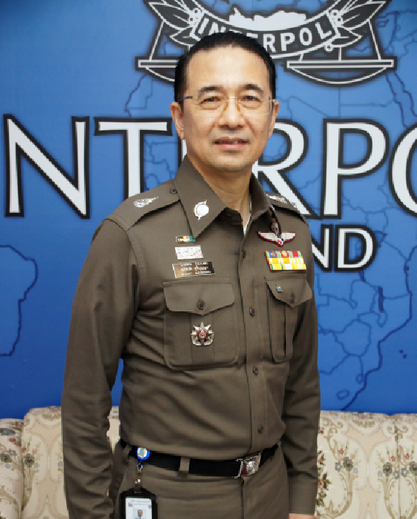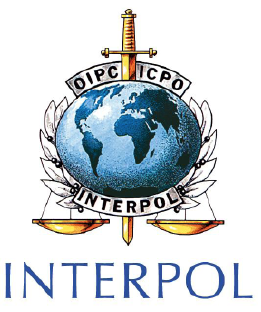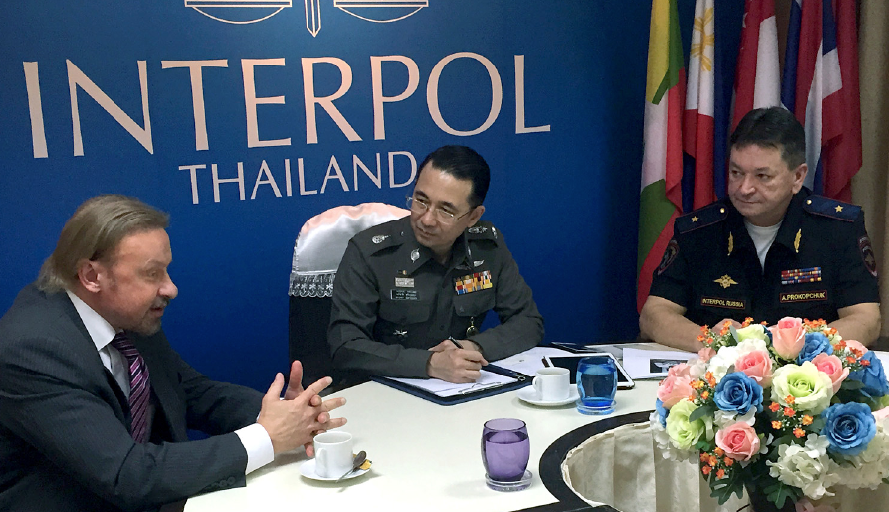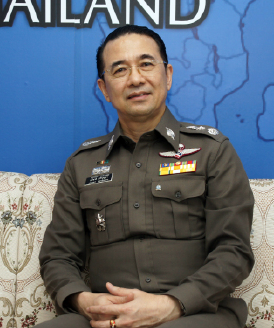By Maxmilian Wechsler
| WITH the number tourists coming to Thailand now exceeding 30 million a year, it’s inevitable that some have committed serious crimes back in their home countries and fled before their police forces can catch up with them. That’s when the INTERPOL (International Criminal Police Organization) and Police Major General Apichat - Joom Suriboonya come into the picture. Pol Maj-Gen Apichat has been in charge of INTERPOL NCB (National Centre Bureau) Thailand and the Royal Thai Police (RTP) Foreign Affairs Division (FAD) since, 2013. The closely linked organisations operate out of Building One at RTP headquarters on Rama 1 Road in Bangkok. The BigChilli caught up with Pol Maj-Gen Apichat in his ninth floor office. “Our primary activity is to capture foreign fugitives, and since 2014 we have arrested about 80 such people in Thailand. They all committed serious crimes in their native countries and escaped to live in Thailand. The arrests were made in Bangkok, Chiang Mai, Koh Samui, Pattaya, and Phuket – basically all over the country. Most of them have been handed over to police in their home countries, but some are still being held at the Immigration Bureau detention centre awaiting deportation.” |
Background
Pol Maj-Gen Apichat has devoted almost his whole life to law enforcement. After finishing high school, he studied at the Royal Thai Police Academy at Sam Phran in Nakhon Pathom province for six years. He worked as an investigator at Don Muang police station in Bangkok for almost three years and was then appointed Assistant Secretary to a Deputy Commissioner-General at the RTP. He worked for this office for two years before being selected to work for another Deputy Commissioner-General.
“I was assigned to that office for three years – until his retirement – and then transferred to Sutthisan police station, where I stayed for two years. After I was assigned to the Foreign Affairs Division and INTERPOL where I have been now for 15 years.”
Asked about his excellent English, Pol Maj-Gen Apichart said: “I started studying English in kindergarten and kept at it all through primary and secondary school.
“After graduating from the Royal Thai Police Academy, I was awarded a scholarship from the Australian Federal Police to study for a Master’s degree and PhD in Australia. Studying there was a great opportunity to improve my English further. I also attended an FBI course in the United States that includes the counter-terrorism, as well as a counter-terrorism training course in Indonesia.”
Triple responsibility
Pol Maj-Gen Apichat explained that his department’s responsibility goes beyond the apprehension of foreign fugitives. “We have three general areas of responsibility – foreign affairs, Interpol, and intelligence. As for the first, it means combining the duties of an interpreter, translator and event organiser. For example, when a police chief from another country comes to meet with the Commissioner-General of the RTP, we organise the event and translate for him. We also must be well versed in bilateral and multilateral law enforcement agreements and mechanisms of cooperation.
“The second responsibility is what we are best known for. It entails combating transnational crime, arresting fugitives and coordinating with the 190 member-countries of Interpol.
“The third area of responsibility is intelligence, which means collecting information about criminal activities from all Thai provinces, which is entered into our computer network. We also do analyses and send the report to the Commissioner-General who is my direct boss.
Pol Maj-Gen Apichat has devoted almost his whole life to law enforcement. After finishing high school, he studied at the Royal Thai Police Academy at Sam Phran in Nakhon Pathom province for six years. He worked as an investigator at Don Muang police station in Bangkok for almost three years and was then appointed Assistant Secretary to a Deputy Commissioner-General at the RTP. He worked for this office for two years before being selected to work for another Deputy Commissioner-General.
“I was assigned to that office for three years – until his retirement – and then transferred to Sutthisan police station, where I stayed for two years. After I was assigned to the Foreign Affairs Division and INTERPOL where I have been now for 15 years.”
Asked about his excellent English, Pol Maj-Gen Apichart said: “I started studying English in kindergarten and kept at it all through primary and secondary school.
“After graduating from the Royal Thai Police Academy, I was awarded a scholarship from the Australian Federal Police to study for a Master’s degree and PhD in Australia. Studying there was a great opportunity to improve my English further. I also attended an FBI course in the United States that includes the counter-terrorism, as well as a counter-terrorism training course in Indonesia.”
Triple responsibility
Pol Maj-Gen Apichat explained that his department’s responsibility goes beyond the apprehension of foreign fugitives. “We have three general areas of responsibility – foreign affairs, Interpol, and intelligence. As for the first, it means combining the duties of an interpreter, translator and event organiser. For example, when a police chief from another country comes to meet with the Commissioner-General of the RTP, we organise the event and translate for him. We also must be well versed in bilateral and multilateral law enforcement agreements and mechanisms of cooperation.
“The second responsibility is what we are best known for. It entails combating transnational crime, arresting fugitives and coordinating with the 190 member-countries of Interpol.
“The third area of responsibility is intelligence, which means collecting information about criminal activities from all Thai provinces, which is entered into our computer network. We also do analyses and send the report to the Commissioner-General who is my direct boss.
| Man in the middle “Thailand became a member of INTERPOL 65 years ago. If you ask me how often I am in communication with INTERPOL headquarters in Lyon, France, I would have to say just about every minute. We are the international gateway of the RTP, coordinating its operations with international police organisations. It’s like we have two bosses. We’re in the middle. “We get instructions from Interpol headquarters in France and the RTP. Both organisations set guidelines for me. The instructions from Lyon are in English language. Interpol has four official languages: English, Spanish, French and Arabic.” Pol Maj-Gen Apichat said that these days his officers spend most of their time tracking down drug traffickers, human traffickers and cyber criminals. “As for terrorism, we only collect intelligence and coordinate closely with the Special Branch, Armed Forces Security Centre and other intelligence agencies. |
“I enjoy my work very much, but I am on call day and night. Sometimes a call comes at 2am from a country where it’s daytime or evening. I often receive calls from embassies in Bangkok in which a police liaison says something like this: ‘We have a criminal case involving one of our nationals who managed to escape to Thailand, where he now lives. Can you arrest him and send him back to us?’
“The authorities in the country where the person is wanted must provide us with an arrest warrant and relevant materials like photos of the suspect and fingerprints.”
Pol Maj-Gen Apichat said most foreign fugitives arrested in Thailand these days are Russians. “Many Russian tourists come to Thailand, and the vast majority are law abiding. They come here because it’s a relaxing, warm vacation destination. But this also attracts Russian criminals,” he said, adding: “We have excellent relations and cooperation with the Russian officials.
“When we arrest a fugitive, for example in Pattaya, we take them to the local police station first and make a report. Then we request that officers from the station bring the fugitive to Bangkok. After that, they are sent to the Immigration Bureau centre in Suan Phlu where they are placed in a detention facility. We then contact the concerned embassy and brief them on the situation.
“We are sometimes involved in undercover work, which can be dangerous. As for myself, I have never had any problems in my police career while arresting foreign fugitives, but some officers haven’t been so lucky.
“Tracing foreign fugitives often means we have to work outside Bangkok. In such cases, I assign staff members to work with the provincial police.
“In order to locate fugitives, we work with many organisations, including the Ministry of Foreign Affairs, Central Investigation Bureau, Anti-Money Laundering Office, Department of Special Investigation, Immigration Bureau, Tourist Police, Crime Suppression Division, Provincial Police and others. I am also in contact with ambassadors at many embassies, and we have good cooperation with them. However, we work closest with the liaison officers who are attached to almost every embassy in Bangkok.”
The biggest challenge facing him and his officers is the explosion of transnational crime in recent years and the new challenges presented by the ASEAN Economic Community (AEC). Under the setup of the AEC, there are fewer restrictions on travel throughout ASEAN for citizens of the ten member-countries. “This will pose a big challenge for me because it means transnational crime will be even bigger. This will be a big issue,” he predicted, adding that his organisation needs more manpower to properly handle the situation.
“Considering the size of the problem and the size of the country, the 121 policemen and policewomen assigned to the FAD and Interpol is not enough. We need more staff, especially those who can speak English and other key languages. Some of the fugitives we deal with have committed serious and violent crimes in their home countries and to let them stay among us in Thailand is dangerous for the country.”
Pol Maj-Gen Apichat is a sympathetic, hard working police officer who deserves credit for a number of successful operations that led to the arrest of foreign criminals. For that and other achievements he is highly regarded by foreign diplomats and law enforcement officers both in Thailand and abroad.
“The authorities in the country where the person is wanted must provide us with an arrest warrant and relevant materials like photos of the suspect and fingerprints.”
Pol Maj-Gen Apichat said most foreign fugitives arrested in Thailand these days are Russians. “Many Russian tourists come to Thailand, and the vast majority are law abiding. They come here because it’s a relaxing, warm vacation destination. But this also attracts Russian criminals,” he said, adding: “We have excellent relations and cooperation with the Russian officials.
“When we arrest a fugitive, for example in Pattaya, we take them to the local police station first and make a report. Then we request that officers from the station bring the fugitive to Bangkok. After that, they are sent to the Immigration Bureau centre in Suan Phlu where they are placed in a detention facility. We then contact the concerned embassy and brief them on the situation.
“We are sometimes involved in undercover work, which can be dangerous. As for myself, I have never had any problems in my police career while arresting foreign fugitives, but some officers haven’t been so lucky.
“Tracing foreign fugitives often means we have to work outside Bangkok. In such cases, I assign staff members to work with the provincial police.
“In order to locate fugitives, we work with many organisations, including the Ministry of Foreign Affairs, Central Investigation Bureau, Anti-Money Laundering Office, Department of Special Investigation, Immigration Bureau, Tourist Police, Crime Suppression Division, Provincial Police and others. I am also in contact with ambassadors at many embassies, and we have good cooperation with them. However, we work closest with the liaison officers who are attached to almost every embassy in Bangkok.”
The biggest challenge facing him and his officers is the explosion of transnational crime in recent years and the new challenges presented by the ASEAN Economic Community (AEC). Under the setup of the AEC, there are fewer restrictions on travel throughout ASEAN for citizens of the ten member-countries. “This will pose a big challenge for me because it means transnational crime will be even bigger. This will be a big issue,” he predicted, adding that his organisation needs more manpower to properly handle the situation.
“Considering the size of the problem and the size of the country, the 121 policemen and policewomen assigned to the FAD and Interpol is not enough. We need more staff, especially those who can speak English and other key languages. Some of the fugitives we deal with have committed serious and violent crimes in their home countries and to let them stay among us in Thailand is dangerous for the country.”
Pol Maj-Gen Apichat is a sympathetic, hard working police officer who deserves credit for a number of successful operations that led to the arrest of foreign criminals. For that and other achievements he is highly regarded by foreign diplomats and law enforcement officers both in Thailand and abroad.
INTERPOL Thailand
INTERPOL NCB Thailand is part of the Foreign Affairs Division, and made up of three subdivisions responsible for specific regions:
• INTERPOL and Coordination Sub-Division (Region 1): Association of Southeast Asian Nations (ASEAN), a geopolitical and economic organisation of 10 countries located in Southeast Asia: Brunei, Cambodia, Indonesia, Laos, Malaysia, Myanmar, Philippines, Singapore, Thailand and Vietnam.
• INTERPOL and Coordination Sub-Division (Region 2): North America, South America, East Asia, and Oceania.
• INTERPOL and Coordination Sub-Division (Region 3): Europe, Africa, Middle East, Central Asia, and South Asia.
Mission statement
To work with the INTERPOL General Secretariat, INTERPOL member countries, embassies in Thailand and other domestic and international government agencies on criminal matters; to support and assist crime suppression agencies; work with relevant domestic crime-fighting agencies on extradition and mutual assistance; to cooperate with the Department of Correction and similar agencies on prisoner transfers and to provide assistance to foreigners in liaison with national law enforcement agencies and assist fellow INTERPOL member countries in law enforcement-related activities.
Priorities
Trafficking in persons and people smuggling, child exploitation, drug trafficking, cybercrime, economic crime, terrorism, arms smuggling, wildlife and timber trafficking and piracy.
INTERPOL NCB Thailand is part of the Foreign Affairs Division, and made up of three subdivisions responsible for specific regions:
• INTERPOL and Coordination Sub-Division (Region 1): Association of Southeast Asian Nations (ASEAN), a geopolitical and economic organisation of 10 countries located in Southeast Asia: Brunei, Cambodia, Indonesia, Laos, Malaysia, Myanmar, Philippines, Singapore, Thailand and Vietnam.
• INTERPOL and Coordination Sub-Division (Region 2): North America, South America, East Asia, and Oceania.
• INTERPOL and Coordination Sub-Division (Region 3): Europe, Africa, Middle East, Central Asia, and South Asia.
Mission statement
To work with the INTERPOL General Secretariat, INTERPOL member countries, embassies in Thailand and other domestic and international government agencies on criminal matters; to support and assist crime suppression agencies; work with relevant domestic crime-fighting agencies on extradition and mutual assistance; to cooperate with the Department of Correction and similar agencies on prisoner transfers and to provide assistance to foreigners in liaison with national law enforcement agencies and assist fellow INTERPOL member countries in law enforcement-related activities.
Priorities
Trafficking in persons and people smuggling, child exploitation, drug trafficking, cybercrime, economic crime, terrorism, arms smuggling, wildlife and timber trafficking and piracy.





 RSS Feed
RSS Feed
















